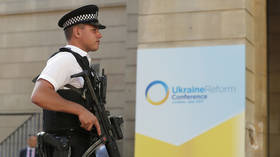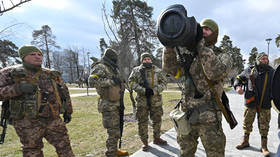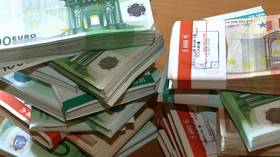Ukraine’s endemic corruption problems are suddenly forgotten as hungry Western investors smell ‘reconstruction’ profits
Thu 11:58 am +01:00, 7 Jul 2022
(Liz Truss very much at the forefront of this conference. Next year to be hosted by UK.
On UKColumn yesterday a list of European countries and the region of Ukraine which they have chosen to “reconstruct” was revealed. Included were areas of Donbass, which should be interesting.)
Rachel Marsden is a columnist, political strategist, and host of independently produced talk-shows in French and English.

The annual Ukraine Reform Conferencehas, since 2017, brought together Western officials and their local ‘civil society’ foot soldiers to discuss ways that Ukraine can reduce its rampant corruption. But this year, before getting underway this week in Lugano, Switzerland, it underwent a name change to the Ukraine Recovery Conference.
Perhaps drawing attention to the existence of the country’s endemic corruption isn’t convenient for those looking to avoid heavy criminal penalties set up to explicitly prevent investment that fuels corruption?
Simply changing the marketing of the conference does nothing to alter the reality. If anything, it’s counterproductive for Ukraine itself and serves to enable and perpetuate serious systemic problems that prevent the country from progressing.
“The authorities are delaying the fulfillment of many important anti-corruption promises,” according to Andrey Borovik, executive director of the Ukraine office of Transparency International, an organization funded by Western governments and multinationals. As for Ukrainian President Volodymyr Zelensky, “corruption just doesn’t seem to worry Mr. Zelensky much – at least when those implicated are close to him,” claimed Kyiv Independent (another Western funded outfit) editor Olga Rudenko in a guest piece for the New York Times in February, right before the Russian military operation started.
Not exactly the kind of guy you’d want overseeing massive investment projects, one would think.
These days, tackling corruption is taking a rhetorical backseat to the Western push to frame Ukraine as just your typical European country. “For the last two years, we have been discussing large European values, mostly a theoretical debate,” Slovenian Prime Minister Janez Jansa has said. “Then, suddenly, we realised that those fundamental European values actually exist. And that they are threatened. And that Europeans are defending them. With their lives. In Ukraine.”
Despite acknowledging that Ukraine would have to enact “a number of important reforms,” EU Commission President Ursula von der Leyen said that “Ukraine has clearly shown commitment to live up to European values and standards. And embarked, before the war, on its way towards the EU.” In reality, the only thing that has actually changed is that Western officials saw an opening to exploit current public sympathy, if not ignorance, to gain acceptance for an idea that normally would be a much tougher sell to the average EU citizen. That is, the notion that Ukraine would be a net benefit to the bloc rather than an Achilles heel rife with problems that has no business being included in a zone that allows for free movement of people and goods among member states.
EU leaders are leading their citizens straight into catastrophe in every imaginable sense through their knee-jerk handling of the conflict itself and now their push to turn the focus to reconstruction even as the bullets are still flying and the corruption rages. Western weapons supplied to Ukraine – and now apparently sold on dark-web marketplaces – are an example of the potentially deadly consequences of ineptitude. Meanwhile, the head of Interpol, Jurgen Stock, has warned EU nations in particular that “the wide availability of weapons during the current conflict will lead to the proliferation of illicit weapons in the post-conflict phase.”
Neglecting to place Ukraine’s corruption problem uncompromisingly front and center in order to better peddle the premature public narrative of the need for investment under the guise of ‘reconstruction’ represents a threat to the EU – and one that Western officials are only too happy to facilitate, apparently. One has to wonder why that is.
It’s hardly a secret that Western nations have historically leveraged foreign aid to gain economic and political footholds within other countries, either through state-backed programs, civil society funding, or corporate opportunities. But there’s also another catch. Current Western laws such as the Foreign Corrupt Practices Act (FCPA) in the US, the UK Bribery Act, or the Loi Sapin II in France all create an obligation for any entity or individual investing in foreign countries to ensure a corruption-free transaction. If Western investment in Ukrainian reconstruction ends up in the wrong hands, then board members, employees, and managers could all end up facing criminal charges with penalties of prison.
The prosecution of such cases tends to be highly selective, of course. How often do you hear of US entities being prosecuted for dealings in corruption-rife Nigeria, for example? You don’t. Because that is Washington’s stomping ground.
The American law has often been used as a tool of selective prosecution against European companies for competitive reasons. This is why other countries have created their own similar rules, largely in the interests of having the legal tools available to jump in to prosecute their own in order to short-circuit American pursuits of foreign competitors.
Western entities have an economic interest in portraying Ukraine as a safe place to invest. Otherwise, they’re easy pickings for the authorities of other foreign countries who might choose to use corrupt investment dealings in Ukraine as a means of taking a competitor off the playing field.
The first interest of such Western enterprises has always been to sideline Russia as a trading partner for Ukraine and then treat the country like the latest iteration of the Wild West. They aim to get taxpayers back home to fund the venture risk, all the while harboring plans to subsequently compete among themselves for any treasure they find – with the added competitive bonus for Washington of having also weakened the EU by isolating it from Russia. But to get the green light, and to convince the average taxpayer to accept funding the risk, everyone has to make the venture sound benevolent – hence the Marshall Plan comparisons – and reduce any references to corruption to a minor detail.
The statements, views and opinions expressed in this column are solely those of the author and do not necessarily represent those of RT.












